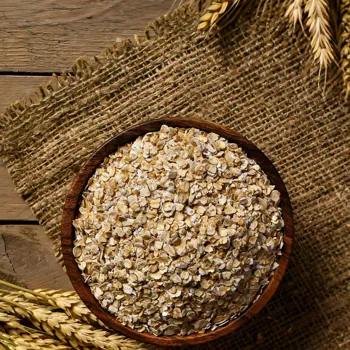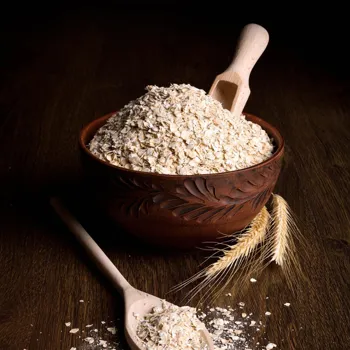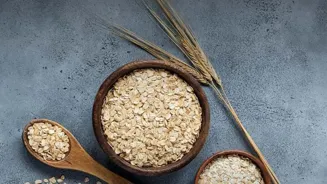Discover the transformative power of a high-fiber diet! Learn why loading up on whole grains is essential for your health
In the hustle-bustle of our daily lives, it's easy to grab quick and convenient
food. But often, these fast options lack a very important ingredient: fiber. Fiber is like a superhero for your gut and overall health.

It's the part of plant-based foods that your body can't digest, and it comes with a whole bunch of perks. So, let's explore why loading up on fiber-rich whole grains is a fantastic idea.
Improved Digestion: Your Gut's Best Friend
Think of fiber as a natural cleaner for your digestive system. It adds bulk to your stool, making it easier to pass and preventing constipation. Imagine a clogged drain - fiber is like the plumber that helps clear things up!
Whole grains like oats, brown rice, and whole wheat bread are packed with insoluble fiber, which is excellent for keeping things moving smoothly. This translates to less bloating, discomfort, and more regular trips to the loo.
Starting your day with a bowl of oats can truly set the tone for a happy tummy throughout the day. It regulates the bowel movement and helps in digestion.
Stable Blood Sugar Levels: A Sweet Relief
Fiber, especially soluble fiber found in foods like barley and lentils, slows down the absorption of sugar into your bloodstream. This means no sudden spikes and crashes, which is great news for everyone, particularly those managing diabetes or trying to prevent it.
Think of it like this: fiber acts like a buffer, preventing blood sugar from soaring too high after a meal. This helps maintain stable energy levels throughout the day, preventing those dreaded mid-afternoon slumps. Including fiber rich foods is important.
Heart Health Hero: Guarding Your Precious Pump
A high-fiber diet can help lower LDL (bad) cholesterol levels, reducing your risk of heart disease. Fiber binds to cholesterol in the digestive system, preventing it from being absorbed into the bloodstream. It's like a natural vacuum cleaner for your arteries!

Foods like flaxseeds and whole grain cereals are excellent choices for promoting heart health. A small change in your diet, such as switching to whole grain bread can have a big impact. High fiber foods are usually rich in micronutrients.
Weight Management Wonder: Feeling Full and Happy
Fiber is your secret weapon for weight management. It adds bulk to your meals without adding many calories, helping you feel full and satisfied for longer. This means you're less likely to overeat or reach for unhealthy snacks between meals.
Include fiber-rich foods like whole grain pasta or quinoa in your meals to increase satiety and prevent cravings. These foods also take longer to chew, giving you more time to register that you're full. They help you stay full for longer hours.
Reduced Cancer Risk: A Powerful Protector
Studies have shown that diets high in fiber may reduce the risk of certain types of cancer, especially colon cancer. Fiber helps move waste through the digestive system more quickly, reducing the amount of time that potentially harmful substances are in contact with the colon lining.
Include a variety of fiber-rich foods in your diet to maximize the protective benefits. Some vegetables are also rich in fiber.
Nourishing Your Gut Microbiome: Happy Bacteria, Happy You
Fiber acts as food for the beneficial bacteria in your gut, promoting a healthy gut microbiome. These good bacteria play a crucial role in digestion, immunity, and even mental health. A diverse and thriving gut microbiome is essential for overall well-being.
Foods like oats and barley are prebiotics, which are types of fiber that specifically feed these beneficial bacteria. Eating fiber foods also help reduce bad cholesterol.
Boosted Energy Levels: Powering Your Day
By stabilizing blood sugar levels and providing sustained energy, fiber can help you feel more energetic throughout the day. Instead of relying on sugary snacks or caffeine for a quick boost, opt for fiber-rich foods that will provide a more consistent and balanced energy source.
A bowl of whole grain cereal or a handful of nuts and seeds can make a big difference in your energy levels. Include fiber rich food to keep full and energized all day long.
Incorporating More Fiber into Your Diet
It's easier than you think to boost your fiber intake.
Start by swapping refined grains (like white bread and white rice) for whole grains. Add beans and lentils to your soups and stews. Snack on fruits, vegetables, nuts, and seeds. Read food labels carefully and choose products that are high in fiber.
Drink plenty of water to help the fiber move through your digestive system. Remember to increase your fiber intake gradually to avoid digestive discomfort. Making small changes can lead to big improvements in your health. A quick change in eating habits can help you stay healthy.
Final Thoughts
A high-fiber diet is a gift you can give to your body. It's a simple yet powerful way to improve your digestion, stabilize your blood sugar, protect your heart, manage your weight, reduce your cancer risk, nourish your gut microbiome, and boost your energy levels.
So, load up on those whole grains and enjoy the numerous health benefits that fiber has to offer. Make sure to check in with a medical practitioner if you have any dietary concerns.
AI Generated Content. Glance/InMobi shall have no liability for the content












